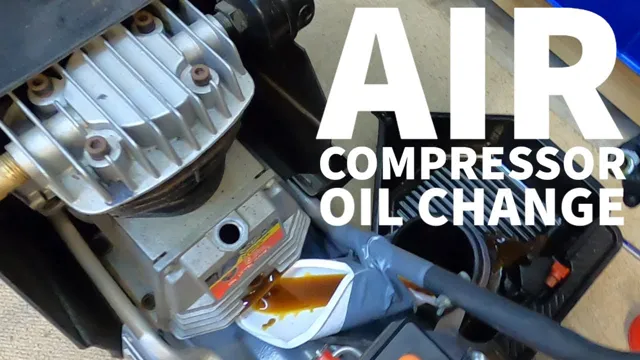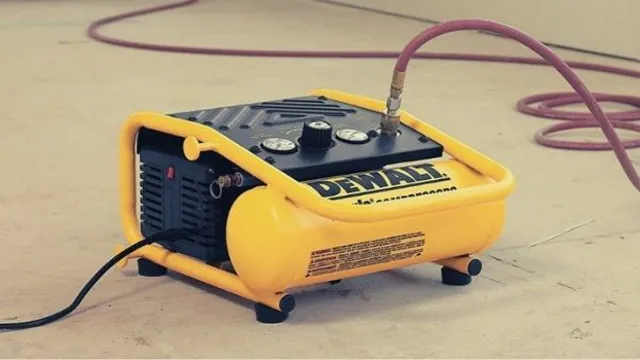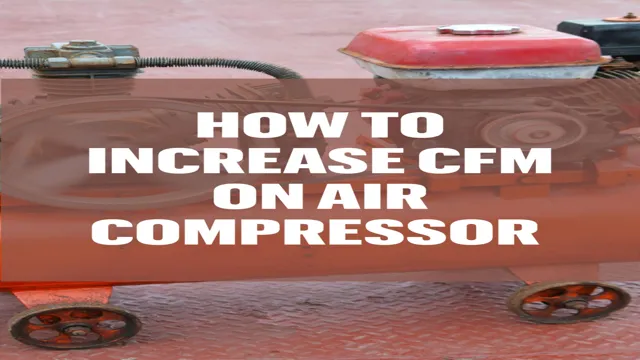
If you own an air compressor, one question that may arise when it comes to its storage is whether it can be kept outside. Well, the answer is yes, but not without some considerations. Storing your air compressor outside can be a convenient option to save up space inside your workshop or garage.
However, since it is an electrical device, keeping it outside exposes it to harsh weather conditions, which can affect its lifespan. In this blog, we’ll dive into the necessary precautions you need to take when storing your air compressor outside, ensuring it stays in good working condition and serves you for a long time.
Understanding Air Compressors
If you’re considering storing your air compressor outside, there are a few things to keep in mind. First and foremost, you’ll need to make sure that the compressor is protected from the elements. Rain, snow, and extreme temperatures can all affect the performance of your compressor, so you’ll want to invest in some kind of shelter or cover to keep it safe.
Additionally, you’ll need to ensure that the compressor is properly secured to prevent theft or damage from animals. Finally, it’s important to note that outdoor storage can also affect the lifespan of your compressor. Exposure to the elements can lead to corrosion and other types of damage, so it’s generally recommended that you store your compressor in a dry, climate-controlled area whenever possible.
With these precautions in mind, it is possible to store an air compressor outside – but it’s important to be aware of the risks and take steps to minimize them.
What is an air compressor?
An air compressor is a machine that pressurizes air to a high level, which can then be used for various purposes. Essentially, it works by forcing air into a container, which is then pressurized and released as needed. Air compressors can come in many different shapes and sizes, from small portable units that can be used for DIY projects, to massive industrial-size compressors used for manufacturing and construction purposes.
One of the most common uses for air compressors is to power pneumatic tools, such as drills, sanders, and spray guns. They can also be used to inflate tires and other inflatable objects. Overall, air compressors are incredibly useful machines that can save time and effort in a variety of different applications.
If you are considering purchasing an air compressor for your home or business, it is important to understand the different types available and choose one that is suited to your needs.

How does an air compressor work?
An air compressor is a machine that converts power into potential energy stored in pressurized air. The machine sucks in ambient air and compresses it into a small container, typically a tank, using a variety of methods such as reciprocating piston compressors, scroll compressors, or rotary screw compressors. The pressure inside the container increases as more air is filled, which can be released through an outlet valve as needed, then the process starts all over again.
Understanding the workings of an air compressor involves comprehending basic principles of physics such as Boyle’s law, which states that the pressure of a gas is inversely proportional to its volume at constant temperature. An air compressor operates by reducing the volume of air to increase its pressure, which in turn stores energy within the machine. Hence, air compressors are ideal for powering tools such as nail guns, sanders, and spray guns, as well as heavy industrial applications like powering the brakes of heavy machinery and vehicles.
Overall, an air compressor is an essential machine in most industries, and understanding its principles is crucial for those who work with them.
What are the different types of air compressors?
Air compressors come in different types tailored for specific applications, from inflating car tires to powering industrial machinery. The most common types of compressors include reciprocating, rotary screw, and centrifugal. Reciprocating compressors use a piston to compress the air, similar to how an engine works.
They are versatile, cost-effective, and suitable for small applications. Rotary screw compressors have two screws that turn in opposite directions to compress the air. They are more energy-efficient and suitable for larger applications.
Centrifugal compressors work by spinning air, which is squeezed into a smaller space and then discharged. They are suitable for large-scale industrial applications and can handle high volumes of air. Understanding the different types of compressors will help you choose the best one for your application and ensure you get the job done efficiently and cost-effectively.
Factors to Consider for Outdoor Storage
When it comes to outdoor storage, there are several factors to consider, especially for equipment like an air compressor. First and foremost, you want to ensure that the storage area is well-ventilated to prevent moisture buildup and rust on the compressor. Additionally, it’s important to protect the compressor from extreme weather conditions such as freezing temperatures or excessive heat.
You should also consider the potential for theft and take precautions by using locks or security cameras. Finally, it’s a good idea to cover the compressor with a tarp or other protective covering to keep it clean and free from debris. So, to answer the question, “Can an air compressor be stored outside?” the answer is yes, as long as proper precautions are taken to protect the equipment from the elements and ensure its safety and longevity.
Climate and Weather Conditions
When it comes to outdoor storage, the climate and weather conditions of your area are crucial factors to consider. If you live in an area with high humidity, it is essential to choose a storage option that is resistant to moisture and mold growth. Similarly, if you live in an area prone to heavy rainfall or snowfall, you need to ensure that your outdoor storage unit has a sturdy roof to prevent any damage to your belongings.
Extreme temperatures, especially high heat, can cause warping and cracking in certain materials, so it is crucial to choose a storage unit made of materials that can withstand fluctuating temperatures. An aluminum storage unit, for example, is an excellent option as it is both resistant to moisture and temperature changes. Ultimately, when selecting an outdoor storage unit, it is essential to take into account the specific weather and climate conditions of your area to ensure that your belongings remain safe and protected.
Protection from Moisture
When it comes to outdoor storage, protection from moisture is a crucial factor to consider. Moisture can cause significant damage to items, including rust, rot, and deterioration. To protect your items, you should consider several factors, like the type of material used for storage, location, and environmental conditions.
For example, metal storage sheds are relatively resistant to moisture, but they can still rust over time without proper maintenance. On the other hand, wooden sheds require regular maintenance to prevent rot and decay. Additionally, when choosing the location for your outdoor storage, choose a dry and well-ventilated area to minimize humidity and ventilation.
Finally, environmental conditions such as rain and snow can increase moisture levels, so you may need to take additional steps to protect your items during these conditions. Ultimately, taking a proactive approach to protect your items from moisture can save you time, money, and frustration in the long run.
Security Measures
When it comes to outdoor storage, security should be a top priority. There are a few factors to consider to ensure that your items are well-protected. Firstly, consider the location of the storage unit.
It should be easily visible from your house or a well-lit area to deter potential thieves. Secondly, invest in a sturdy lock to prevent unauthorized access. A good quality padlock or combination lock can make a big difference.
Thirdly, consider installing surveillance cameras or motion-activated lights to deter burglars. Lastly, be mindful of what you store outdoors and consider whether certain items are better off being stored indoors, as they may be valuable or sensitive. By taking these precautions, you can ensure that your outdoor storage is as secure as possible.
Tips for Outdoor Storage
If you’re wondering whether an air compressor can be stored outside, the answer is it depends. If you live in an area with extreme temperatures or lots of moisture, it may not be a good idea to leave your air compressor outside as it could damage the unit over time. However, if you live in a milder climate and need to save space in your garage or workshop, storing your air compressor outdoors could be a viable option.
To ensure proper protection, consider purchasing a weather-resistant cover or enclosure for your compressor. Additionally, be sure to follow the manufacturer’s instructions on how to properly maintain and care for your air compressor to prolong its lifespan and keep it in good working condition.
Cover It Up
If you’re storing outdoor equipment or furniture over the winter months, it’s important to take some steps to protect them from the elements. One of the best ways to do this is to cover them up with a suitable material. A high-quality cover will keep out rain, snow, and other forms of moisture, preventing damage to your belongings.
When choosing a cover, it’s important to ensure that it fits securely and is made from a durable, weather-resistant material. You don’t want to be dealing with a torn or flimsy cover halfway through the winter. Make sure you also choose the right size cover to fully protect your items and prevent any exposure to the elements.
With the right cover, you can ensure that your outdoor belongings remain in good condition and ready for use when spring comes around.
Keep it Elevated
When it comes to outdoor storage, keeping your items elevated can make a significant difference in how well they hold up against the elements. Whether you’re storing gardening tools, outdoor furniture, or even a boat, moisture and pests can wreak havoc on anything that’s left on the ground. That’s why choosing storage options that are raised off the ground can protect your belongings from damage and keep them in better condition for longer.
Depending on your needs, you can opt for anything from simple rack systems to more comprehensive sheltered storage solutions that provide additional protection from rain, snow, and UV rays. By keeping your outdoor items elevated, you’ll be able to store them with confidence and enjoy them season after season.
Conclusion
In conclusion, storing an air compressor outside is certainly possible, but it requires careful consideration of various factors such as weather conditions, security, and proper maintenance. With the right setup and precautions, your air compressor can function as efficiently even in the great outdoors. So go ahead, get your compressor some fresh air and make your workspace a little more flexible – just don’t forget to give it some TLC!”
FAQs
What type of air compressor is suitable for outdoor storage?
Air compressors with weather-resistant housing or covers are suitable for outdoor storage.
What factors should I consider when storing an air compressor outside?
You should consider the climate/temperature, humidity levels, and protection from elements when storing an air compressor outside.
Can extreme temperatures affect the performance of an air compressor stored outside?
Yes, extreme temperatures can affect the performance of an air compressor stored outside, especially in very cold conditions where the air compressor can freeze up.
How can I protect my air compressor from the elements if it needs to be stored outside?
You can use weather-resistant covers or housing for your air compressor, and make sure it’s placed in a dry location and protected from direct sunlight.
Can moisture damage an air compressor stored outside?
Yes, moisture can damage an air compressor stored outside, especially in humid environments where water can accumulate and cause rust and corrosion.
Should I drain the air compressor of air and oil before storing it outside?
It’s a good idea to drain the air compressor of air and oil before storing it outside to prevent any moisture or debris from accumulating inside.
How often should I check on my air compressor stored outside to ensure its performance?
It’s recommended to check on your air compressor stored outside at least once a week to ensure it’s running smoothly, and to perform any necessary maintenance or repairs.







